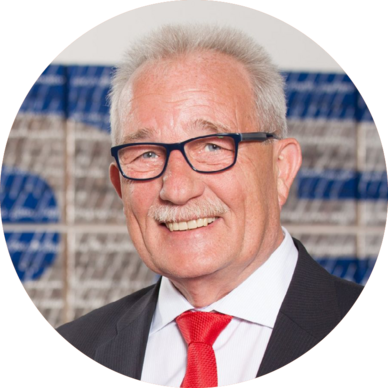Bernhard Thies
D.Eng., our sustainability expert
Dr. Bernhard Thies, born 1951, studied Power Engineering at Aachen Technical University, earning his doctorate at the Institute of General Electrotechnics and High-Voltage Technology. From 1984 to 1998 he held various positions with ABB (BBC), working as development engineer, Head of Production Planning, Head of Profit Center Gas-insulated Switchgear, Management Spokesman ABB Trafo GmbH, and Head of Marketing International Business Area Distribution Transformers.
In 1999 Dr. Thies joined the German Commission for Electrical, Electronic & Information Technologies as Deputy Managing Director. He was appointed Chairman of the Board of Directors in May 2007.
Since October 2008, Dr. Thies has held a lecturing position at Aachen Technical University, teaching MSc courses on the subject of “Protective Measures and Equipment in Power Supply Systems and Electrical Installations”.
In his capacity as Secretary of the German National Committee of the IEC International Electro-technical Commission in Geneva and the European Electro-technical Commission in Brussels, Dr. Thies also represented the German interests in various management committees, working in standardisation fields such as Industry (4.0), Mobility, Smart Cities as well as in the cross-sectional areas of Digital Transformation, Cyber Security, and Artificial Intelligence.
Since 2012 he has been Vice Chairman of the Board and co-founder of Cologne-based EEBus Initiative (Energy efficiency in residential buildings and offices).
In January 2015 Dr. Thies took up office as future CENELEC President; his CENELEC presidency lasted from 2016 until 2018.
He left the German Commission for Electrical, Electronic & Information Technologies in May 2017, having also been a member of the Economic Committee of the German-Chinese Cooperation up to that year.
The CENELEC members elected him Vice-President for Politics for the time 2019/2020.
In 2019 he was elected chairman of the executive board to VDE Association for Electrical, Electronic & Information Technologies of the Bergisches Land / Südwestfalen regional sub-division .
Sustainability to me means ...
… fair trade, social responsibility, and a respectful attitude towards our planet's resources.
1. Ecological sustainability
The conscientious use of resources means an increase in energy efficiency, the utilisation of renewable energies as well as an environmentally-friendly production chain which minimises pollutant emissions and will be able to do totally without them in the long run.
2. Economic sustainability
The issue here is the preservation and continuation of our economy's proper functioning. This implies a transparent and responsible handling of entrepreneurial actions and an insight-orientated cooperation between governments and businesses.
3. Social sustainability
Businesses and organisations have to reinforce human and social resources, apprenticeships and jobs must be made available. Know-how, expertise, and motivation of individual employees represent the human capital, while social resources encompass the interpersonal relationships within all enterprises and structures.
We all are called upon to promote these three pillars of sustainability and stand up for themin our respective fields.
Four questions for Bernhard Thies
To me, Hansa means safeguarding the network of people in all fields and expanding it further.
I expect of the Hansa Congress that we understand each other and in joint actions create a future worth living in.
Future Digitalisation: In certain fields, digital transformation has already started. But we are just at the beginning. We can save our planet with the help of digitalisation. As Karl-Heinz Land (German transformation expert and digital Darwinist) claims, “The second planet will be digital.”
What can visitors expect of you in the discussions? What do we have to talk about in the individual sessions? Using the three pillars of sustainability as our base camp, we will jointly exchange our arguments on the subsequent topics and consider what conclusions to draw.
Industry: Through its innovative capabilities and conscientious actions, industry can become the driving force of sustainability, increasing thereby competitiveness and our survival on the national, European and overseas markets.
The Crafts: Our handicraft establishments play a significant part as substantial components of the three pillars in many walks of life, dealing with the installation of renewable-energy systems, thermal insulation, energy-efficient housing, electric mobility, overhauls, restorations, modernisation, recycling, food etc.
Services imply a special kind of economic goods, a service rendered which cannot be stored, with production and consumption taking place simultaneously. There are personalised (e.g. care) and factual (e.g. car repairs) services. They also differ in regard to the qualification of the realisation in primary services (simple activity) and secondary services (lawyer).
Those three pillars of sustainability will be pivotal factors during discussions.
Tourism contributes to global changes (climate change and depletion of resources) and is affected by it at the same time. It must be our aim to preserve nature and protect our culture.
Health: Sustainable developments in healthcare more and more find their way into public awareness. The quality of our healthcare system does not so much show in its “first” class, but rather in the “third”. Sustainability in this context means that everybody has equal access to sufficient Medicare, with medical facilities not too far away and available for all patients.
Sustainability constitutes the guiding principle for political, economic and ecological action, ensuring that a natural system is preserved long-term in its key functions. While safeguarding our environment and its biological diversity, we have to strive for consumption reduction and the protection of our resources at the same time, thus enhancing and conserving our quality of life. Though keeping an eye on the present, sustainability will always be directed at the future in general as well as at generations to come.”

